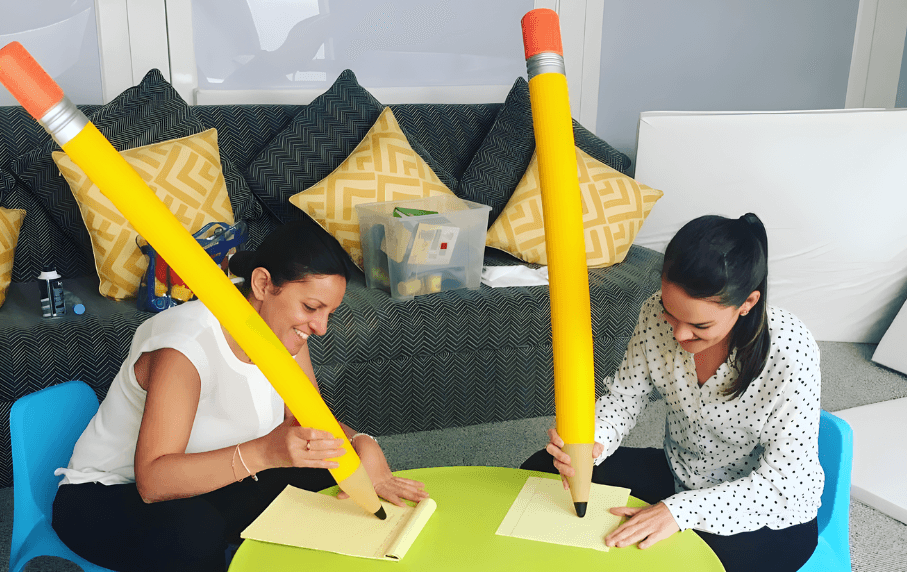
As parents, we often don’t realise that, through our own actions, we are encouraging our children’s negative behaviours, such as: screaming, whining, kicking, and not listening. Young children are incredibly attentive, and they crave adult attention, be it positive or negative. Preschool children are especially adept at testing adults because, developmentally, they are on a quest for autonomy. This is why learning positive parenting skills is so important.
Children this young simply do not understand consequences, the “If you… I will…” type of experience that parents often mistake for a “teaching moment.” Such language structures have no meaning to them at such a young age, which is why they constantly test boundaries, often just to see what happens. Although many parents see these behaviours as a never-ending test of their sanity, these behaviours are normal, predictable, and part of every child’s younger years.
During these early years, children become surprisingly independent as they develop their language and social skills, along with the necessary structure to lead a healthy life. These formative years are a critical time for children because the behaviours and attitudes that are shaped during this period will last throughout their lives.
At this stage, children need parents who understand that discipline is a process that is learnt over time and an important contributing foundation to their being. Discipline includes teaching your children how to become independent learners, to think for themselves, and to make the right choices.
However, teaching through speaking is not enough. A successful parent will teach, practice, and reinforce the rules of good behaviour. This is best accomplished by reflecting that behaviour in front of your child, making you a genuine, positive parenting role model for your children.
Here is a scenario many of us have witnessed and which not a few of us may have experienced (perhaps to our shame).
Dina and Hassan, her 4-year-old, enter the local supermarket. She needs to buy her weekly groceries. The shopping trip has been squeezed in between picking the children up from school, dropping the eldest off to tennis practice, and passing by the in-law’s house for a quick coffee.
 As they enter the supermarket, Hassan immediately runs towards the familiar aisle of sweets. His mother hurries behind him and says, “No sweets Hassan. Come on, let’s hurry and get the shopping; we’re late and still need to pick Zeid up from tennis.”
As they enter the supermarket, Hassan immediately runs towards the familiar aisle of sweets. His mother hurries behind him and says, “No sweets Hassan. Come on, let’s hurry and get the shopping; we’re late and still need to pick Zeid up from tennis.”
In response, Hassan glares at his mother and begins to whine. “Don’t whine. No sweets. You’ve already had sweets today at grandmas and we haven’t had lunch.”
Hassan’s initial whine now turns into a cry, followed by a screaming crescendo that would put any trombone to shame. “I need to have sweets. Ahhh, I need to have sweets,” the boy yells.
“Stop screaming. I said no sweets,” Dina responds, trying to be firm.
“I hate you” he screams, “You’re a wicked mummy.”
Dina looks at him with utter despair, fully aware that every single person in the supermarket is now staring at her thinking what a cruel mother she is and wondering what terrible thing she has done to upset this poor child.
As Hassan is about to kick the shopping cart and knock an entire shelf of lollipops over, Dina quickly relents, “You want a lollipop? Here’s a lollipop. Now be a good boy and let’s finish the shopping.”
Hassan takes the lollipop. Dina no longer has time to finish her shopping and leaves the store, frustrated and emotionally exhausted.
Does this scenario sound familiar? Now, let me ask you, what has Dina taught her son?
The next time Hassan wants a lollipop, will he say, “Mummy may I have lollipop, please?” Highly unlikely.
The message her son learned from this experience is very clear: if you want a lollipop, you have to scream and yell for about seven minutes, preferably in a public place. Then, when and only when I am fuming with frustration and anger, mummy will then give you a lollipop.
This kind of outburst is a common occurrence in children from 2-6 years old. If not managed correctly, this familiar situation can and will happen with young children and can sometimes extend into the teenage years.
Parenting and behaviour management is a skill. Like any skill, you can learn to be a better parent. Your job as a parent is to create the kind of environment that will make it easier for your child to know how you want them to behave.
The way one behaves is directly related to how one feels at the moment and/or a reaction towards something that has occurred in our environment. It is what happens immediately after a behaviour which determines whether or not the behaviour will reoccur again in the future.
As the grown up in the parent/child relationship, it is your responsibility to be a positive role model, using positive parenting skills to reinforce good behaviours with your own actions.
Studies have shown that, as a parent, changing your pattern of verbal and non-verbal behaviour can help in improving your child’s behaviour and communication skills. My 10-week Parent-Child Interaction Coaching will be valuable to any parent or guardian who is struggling to improve their parenting skills.